The Cambridge History of China. Vol. 13: Republican China 1912-1949, Part 2
Подождите немного. Документ загружается.

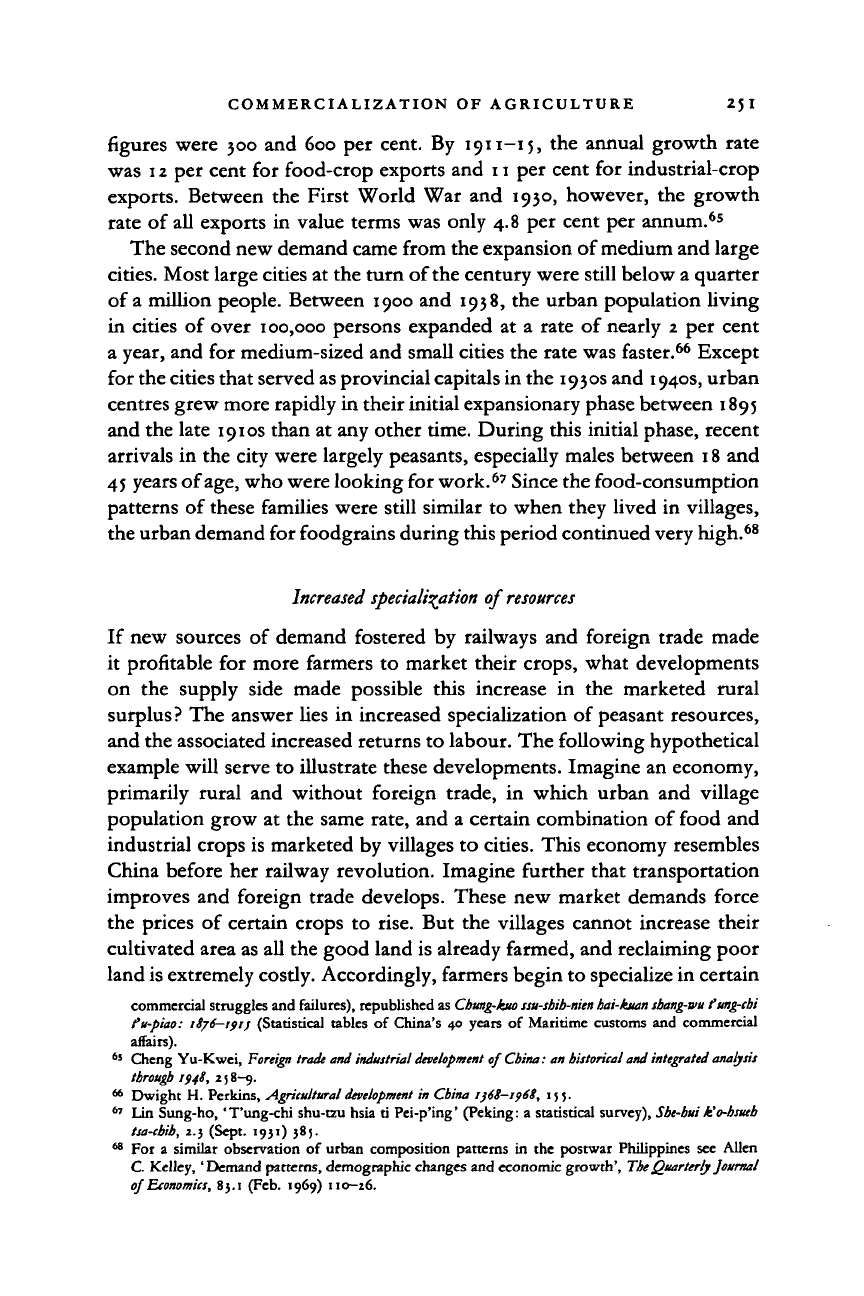
COMMERCIALIZATION OF AGRICULTURE 2JI
figures were 300 and 600 per cent. By 1911-15, the annual growth rate
was 12 per cent for food-crop exports and 11 per cent for industrial-crop
exports. Between the First World War and 1930, however, the growth
rate of all exports in value terms was only 4.8 per cent per annum.
65
The second new demand came from the expansion of medium and large
cities.
Most large cities at the turn of the century were still below a quarter
of a million people. Between 1900 and 1938, the urban population living
in cities of over 100,000 persons expanded at a rate of nearly 2 per cent
a year, and for medium-sized and small cities the rate was faster.
66
Except
for the cities that served as provincial capitals in the 1930s and 1940s, urban
centres grew more rapidly in their initial expansionary phase between 1895
and the late 1910s than at any other time. During this initial phase, recent
arrivals in the city were largely peasants, especially males between 18 and
45 years of
age,
who were looking for work.
67
Since the food-consumption
patterns of these families were still similar to when they lived in villages,
the urban demand for foodgrains during this period continued very high.
68
Increased specialisation of resources
If new sources of demand fostered by railways and foreign trade made
it profitable for more farmers to market their crops, what developments
on the supply side made possible this increase in the marketed rural
surplus? The answer lies in increased specialization of peasant resources,
and the associated increased returns to labour. The following hypothetical
example will serve to illustrate these developments. Imagine an economy,
primarily rural and without foreign trade, in which urban and village
population grow at the same rate, and a certain combination of food and
industrial crops is marketed by villages to cities. This economy resembles
China before her railway revolution. Imagine further that transportation
improves and foreign trade develops. These new market demands force
the prices of certain crops to rise. But the villages cannot increase their
cultivated area as all the good land is already farmed, and reclaiming poor
land is extremely costly. Accordingly, farmers begin to specialize in certain
commercial struggles and failures), republished as Cbung-kuo ssu-sbib-nien bai-kmn sbang-wu fung-cbi
fu-piao: tt/f-ifi; (Statistical tables
of
China's
40
years
of
Maritime customs and commercial
affairs).
65
Cheng Yu-Kwei, Foreign trade and industrial development
of
China: an historical and integrated analysis
through 194S, 258-9.
66
Dwight
H.
Perkins, Agricultural development
in
China rjfS-ipft, 155.
67
Lin Sung-ho, 'T'ung-chi shu-tzu hsia
ti
Pei-p'ing' (Peking:
a
statistical survey), Sbe-buik'o-bsueb
tsa-ebib,
2.}
(Sept. 1931) 38).
68
For
a
similar observation
of
urban composition patterns
in the
postwar Philippines
see
Allen
C.
Kelley, 'Demand patterns, demographic changes and economic growth', The Quarterly Journal
of Economics, 83.1 (Feb. 1969) 110-26.
Cambridge Histories Online © Cambridge University Press, 2008
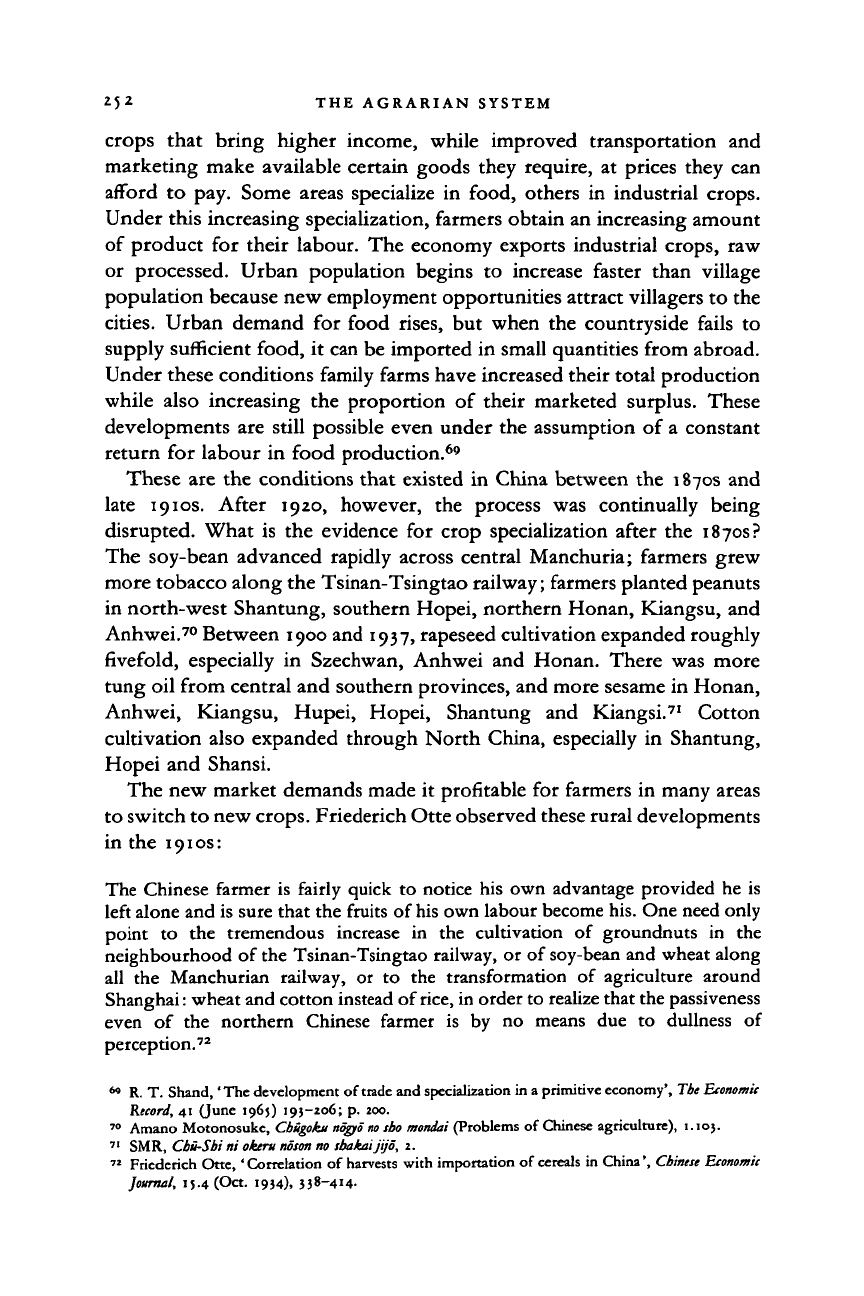
THE AGRARIAN SYSTEM
crops that bring higher income, while improved transportation and
marketing make available certain goods they require, at prices they can
afford to pay. Some areas specialize in food, others in industrial crops.
Under this increasing specialization, farmers obtain an increasing amount
of product for their labour. The economy exports industrial crops, raw
or processed. Urban population begins to increase faster than village
population because new employment opportunities attract villagers to the
cities.
Urban demand for food rises, but when the countryside fails to
supply sufficient food, it can be imported in small quantities from abroad.
Under these conditions family farms have increased their total production
while also increasing the proportion of their marketed surplus. These
developments are still possible even under the assumption of a constant
return for labour in food production.
69
These are the conditions that existed in China between the 1870s and
late 1910s. After 1920, however, the process was continually being
disrupted. What is the evidence for crop specialization after the 1870s?
The soy-bean advanced rapidly across central Manchuria; farmers grew
more tobacco along the Tsinan-Tsingtao railway; farmers planted peanuts
in north-west Shantung, southern Hopei, northern Honan, Kiangsu, and
Anhwei.
70
Between 1900 and 1937, rapeseed cultivation expanded roughly
fivefold, especially in Szechwan, Anhwei and Honan. There was more
tung oil from central and southern provinces, and more sesame in Honan,
Anhwei, Kiangsu, Hupei, Hopei, Shantung and Kiangsi.
71
Cotton
cultivation also expanded through North China, especially in Shantung,
Hopei and Shansi.
The new market demands made it profitable for farmers in many areas
to switch to new crops. Friederich Otte observed these rural developments
in the 1910s:
The Chinese farmer is fairly quick to notice his own advantage provided he is
left alone and is sure that the fruits of
his
own labour become his. One need only
point to the tremendous increase in the cultivation of groundnuts in the
neighbourhood of the Tsinan-Tsingtao railway, or of soy-bean and wheat along
all the Manchurian railway, or to the transformation of agriculture around
Shanghai: wheat and cotton instead of
rice,
in order to realize that the passiveness
even of the northern Chinese farmer is by no means due to dullness of
perception.
72
69
R. T.
Shand, "The development
of
trade and specialization
in a
primitive economy', The Economic
Record,
41 (June 1965) 193-Z06;
p. 200.
70
Amano Motonosuke, Cbugoku nogo
no
sbo mondai (Problems
of
Chinese agriculture), 1.103.
71
SMR,
Cbi-Sbi
ni
ohcru noson
no
sbakaijijo,
2.
71
Friederich Otte, 'Correlation of harvests with importation of cereals in China',
Chinese Economic
Journal,
15.4 (Oct. 1954). 33
8
-4'4-
Cambridge Histories Online © Cambridge University Press, 2008
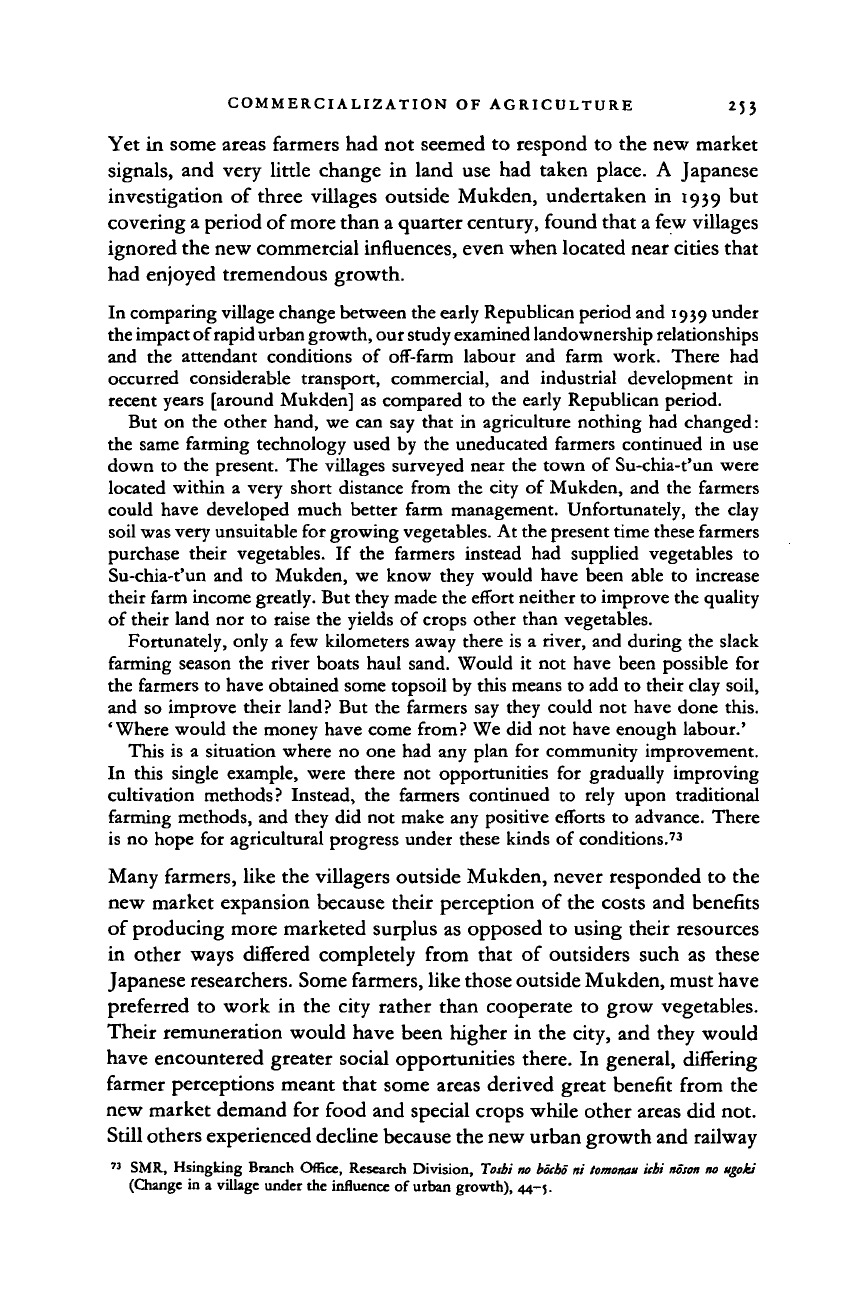
COMMERCIALIZATION OF AGRICULTURE 253
Yet in some areas farmers had not seemed to respond to the new market
signals, and very little change in land use had taken place. A Japanese
investigation of three villages outside Mukden, undertaken in 1939 but
covering a period of more than a quarter century, found that a few villages
ignored the new commercial influences, even when located near cities that
had enjoyed tremendous growth.
In comparing village change between the early Republican period and 1939 under
the impact of rapid urban growth, our study examined landownership relationships
and the attendant conditions of off-farm labour and farm work. There had
occurred considerable transport, commercial, and industrial development in
recent years [around Mukden] as compared to the early Republican period.
But on the other hand, we can say that in agriculture nothing had changed:
the same farming technology used by the uneducated farmers continued in use
down to the present. The villages surveyed near the town of Su-chia-t'un were
located within a very short distance from the city of Mukden, and the farmers
could have developed much better farm management. Unfortunately, the clay
soil was very unsuitable for growing vegetables. At the present time these farmers
purchase their vegetables. If the farmers instead had supplied vegetables to
Su-chia-t'un and to Mukden, we know they would have been able to increase
their farm income greatly. But they made the effort neither to improve the quality
of their land nor to raise the yields of crops other than vegetables.
Fortunately, only a few kilometers away there is a river, and during the slack
farming season the river boats haul sand. Would it not have been possible for
the farmers to have obtained some topsoil by this means to add to their clay soil,
and so improve their land? But the farmers say they could not have done this.
'Where would the money have come from? We did not have enough labour.'
This is a situation where no one had any plan for community improvement.
In this single example, were there not opportunities for gradually improving
cultivation methods? Instead, the farmers continued to rely upon traditional
farming methods, and they did not make any positive efforts to advance. There
is no hope for agricultural progress under these kinds of conditions.
73
Many farmers, like the villagers outside Mukden, never responded to the
new market expansion because their perception of the costs and benefits
of producing more marketed surplus as opposed to using their resources
in other ways differed completely from that of outsiders such as these
Japanese researchers. Some farmers, like those outside Mukden, must have
preferred to work in the city rather than cooperate to grow vegetables.
Their remuneration would have been higher in the city, and they would
have encountered greater social opportunities there. In general, differing
farmer perceptions meant that some areas derived great benefit from the
new market demand for food and special crops while other areas did not.
Still others experienced decline because the new urban growth and railway
71
SMR, Hsingking Branch Office, Research Division, Toibi no
bocbo
ni tomonau iebi
noson
no ugoki
(Change in a village under the influence of urban growth), 44-5.
Cambridge Histories Online © Cambridge University Press, 2008
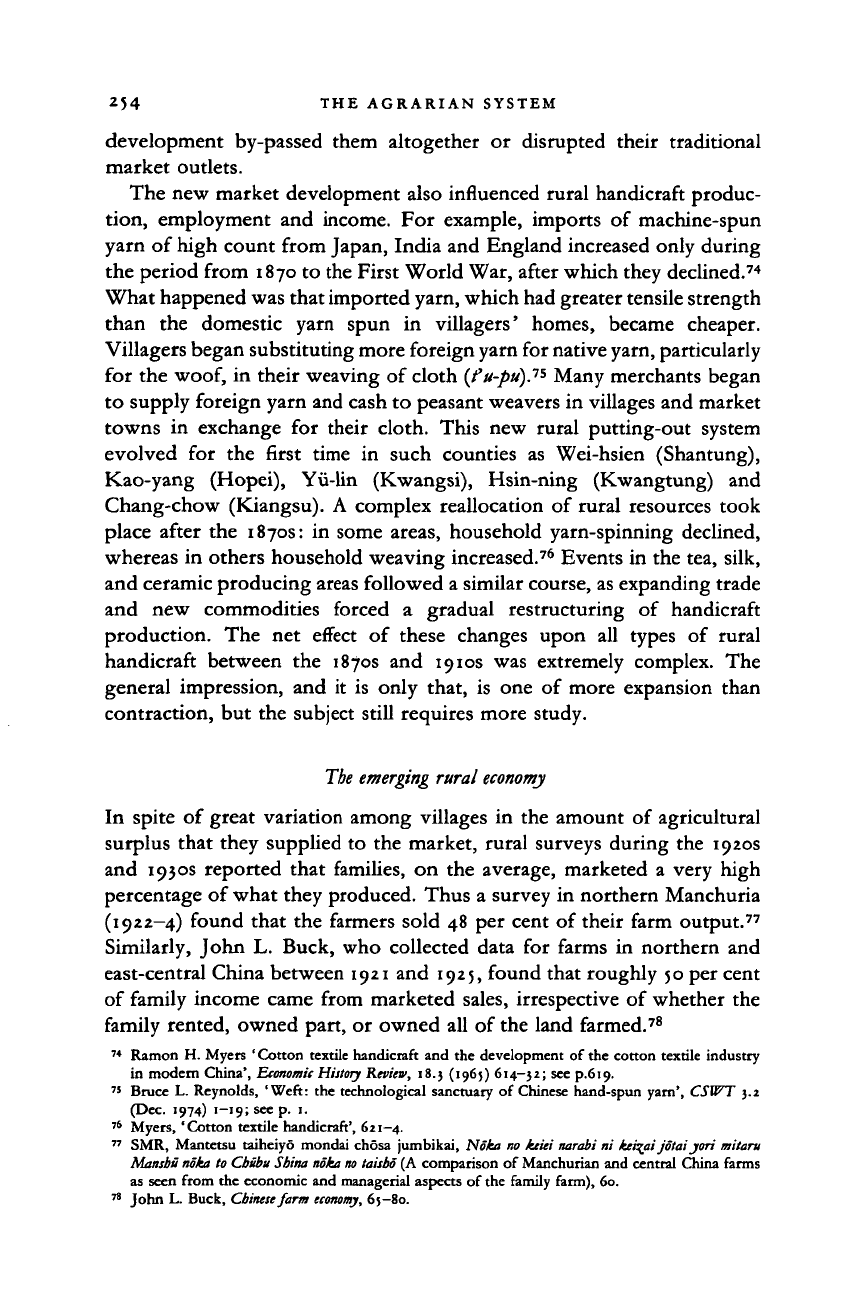
2J4 THE AGRARIAN SYSTEM
development by-passed them altogether or disrupted their traditional
market outlets.
The new market development also influenced rural handicraft produc-
tion, employment and income. For example, imports of machine-spun
yarn of high count from Japan, India and England increased only during
the period from 1870 to the First World War, after which they declined.
74
What happened was that imported yarn, which had greater tensile strength
than the domestic yarn spun in villagers' homes, became cheaper.
Villagers began substituting more foreign yarn for native yarn, particularly
for the
woof,
in their weaving of cloth {fu-pu).
lh
Many merchants began
to supply foreign yarn and cash to peasant weavers in villages and market
towns in exchange for their cloth. This new rural putting-out system
evolved for the first time in such counties as Wei-hsien (Shantung),
Kao-yang (Hopei), Yii-lin (Kwangsi), Hsin-ning (Kwangtung) and
Chang-chow (Kiangsu). A complex reallocation of rural resources took
place after the 1870s: in some areas, household yarn-spinning declined,
whereas in others household weaving increased.
76
Events in the tea, silk,
and ceramic producing areas followed a similar course, as expanding trade
and new commodities forced a gradual restructuring of handicraft
production. The net effect of these changes upon all types of rural
handicraft between the 1870s and 1910s was extremely complex. The
general impression, and it is only that, is one of more expansion than
contraction, but the subject still requires more study.
The emerging rural economy
In spite of great variation among villages in the amount of agricultural
surplus that they supplied to the market, rural surveys during the 1920s
and 1930s reported that families, on the average, marketed a very high
percentage of what they produced. Thus a survey in northern Manchuria
(1922-4) found that the farmers sold 48 per cent of their farm output.
77
Similarly, John L. Buck, who collected data for farms in northern and
east-central China between 1921 and 1925, found that roughly 50 per cent
of family income came from marketed sales, irrespective of whether the
family rented, owned part, or owned all of the land farmed.
78
74
Ramon
H.
Myers
'
Cotton textile handicraft and the development
of
the cotton textile industry
in modern China', Economic History Review, 18.3 (196;) 614—32; see p.619.
75
Bruce
L.
Reynolds, 'Weft: the technological sanctuary
of
Chinese hand-spun yarn', CSWT 3.2
(Dec. 1974) 1-19; see p.
1.
76
Myers, 'Cotton textile handicraft', 621—4.
77
SMR, Mantetsu taiheiyo mondai chosa jumbikai, Noka no ktiei narabi
ni
kti\ai jotaiyori mitaru
Mansbu noka
to
Cbubu Sbina noka no taisbo (A comparison
of
Manchurian and central China farms
as seen from the economic and managerial aspects
of
the family farm), 60.
78
John L. Buck,
Chinese farm
economy,
65—80.
Cambridge Histories Online © Cambridge University Press, 2008
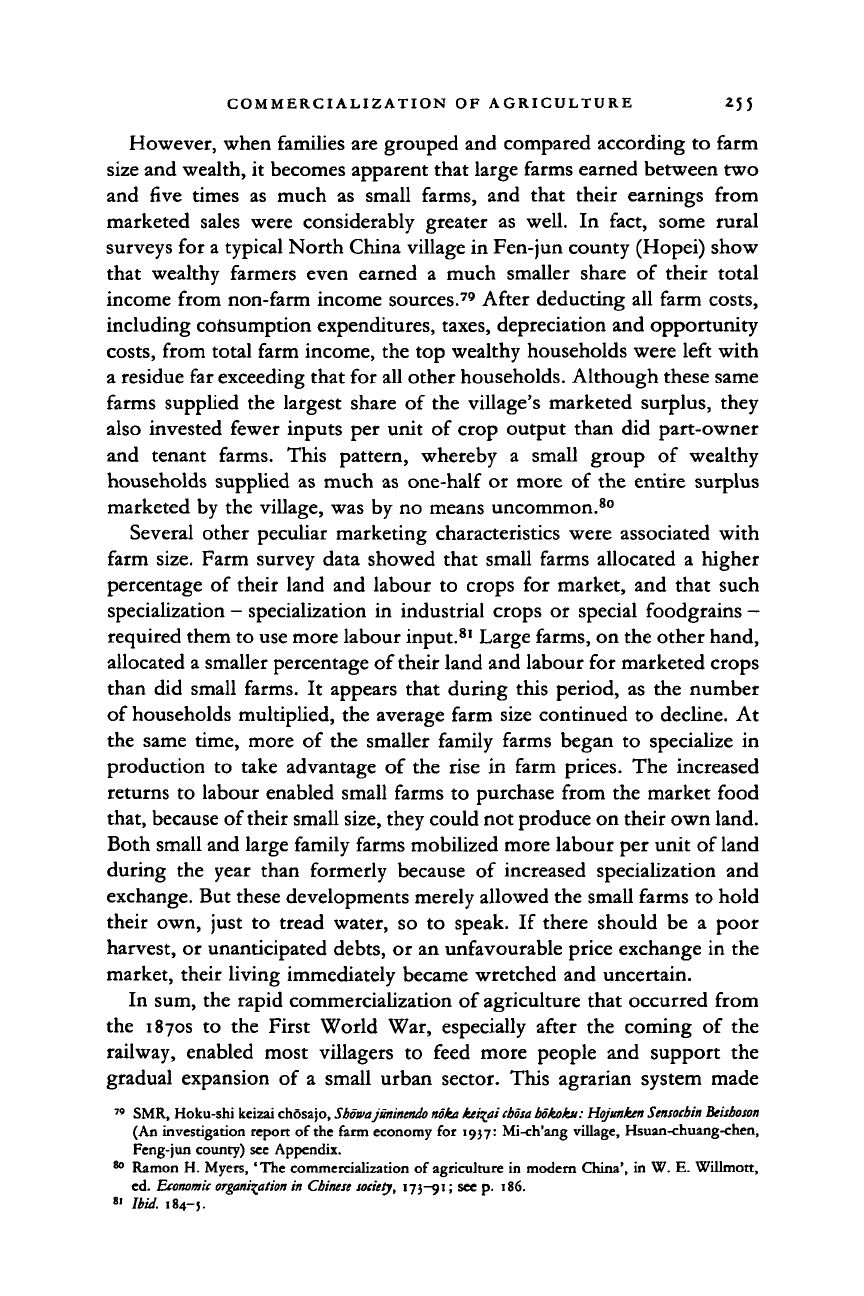
COMMERCIALIZATION OF AGRICULTURE 255
However, when families are grouped and compared according to farm
size and wealth, it becomes apparent that large farms earned between two
and five times as much as small farms, and that their earnings from
marketed sales were considerably greater as well. In fact, some rural
surveys for a typical North China village in Fen-jun county (Hopei) show
that wealthy farmers even earned a much smaller share of their total
income from non-farm income sources.
79
After deducting all farm costs,
including consumption expenditures, taxes, depreciation and opportunity
costs,
from total farm income, the top wealthy households were left with
a residue far exceeding that for all other households. Although these same
farms supplied the largest share of the village's marketed surplus, they
also invested fewer inputs per unit of crop output than did part-owner
and tenant farms. This pattern, whereby a small group of wealthy
households supplied as much as one-half or more of the entire surplus
marketed by the village, was by no means uncommon.
80
Several other peculiar marketing characteristics were associated with
farm size. Farm survey data showed that small farms allocated a higher
percentage of their land and labour to crops for market, and that such
specialization
—
specialization in industrial crops or special foodgrains
—
required them to use more labour input.
81
Large farms, on the other hand,
allocated a smaller percentage of their land and labour for marketed crops
than did small farms. It appears that during this period, as the number
of households multiplied, the average farm size continued to decline. At
the same time, more of the smaller family farms began to specialize in
production to take advantage of the rise in farm prices. The increased
returns to labour enabled small farms to purchase from the market food
that, because of their small size, they could not produce on their own land.
Both small and large family farms mobilized more labour per unit of land
during the year than formerly because of increased specialization and
exchange. But these developments merely allowed the small farms to hold
their own, just to tread water, so to speak. If there should be a poor
harvest, or unanticipated debts, or an unfavourable price exchange in the
market, their living immediately became wretched and uncertain.
In sum, the rapid commercialization of agriculture that occurred from
the 1870s to the First World War, especially after the coming of the
railway, enabled most villagers to feed more people and support the
gradual expansion of a small urban sector. This agrarian system made
75
SMR, Hoku-shi keizai chosajo, Sbowajuninendo noka
keh^ai cbosa
bokoku: Hojunken
Sensocbin Beisboson
(An investigation report
of
the farm economy
for
1957: Mi-ch'ang village, Hsuan-chuang-chen,
Feng-jun county)
see
Appendix.
80
Ramon
H.
Myers, "The commercialization
of
agriculture
in
modern China',
in W. E.
Willmott,
ed.
Economic organisation in Chinese society, 173-91; see
p. 186.
81
Ibid.
184-j.
Cambridge Histories Online © Cambridge University Press, 2008
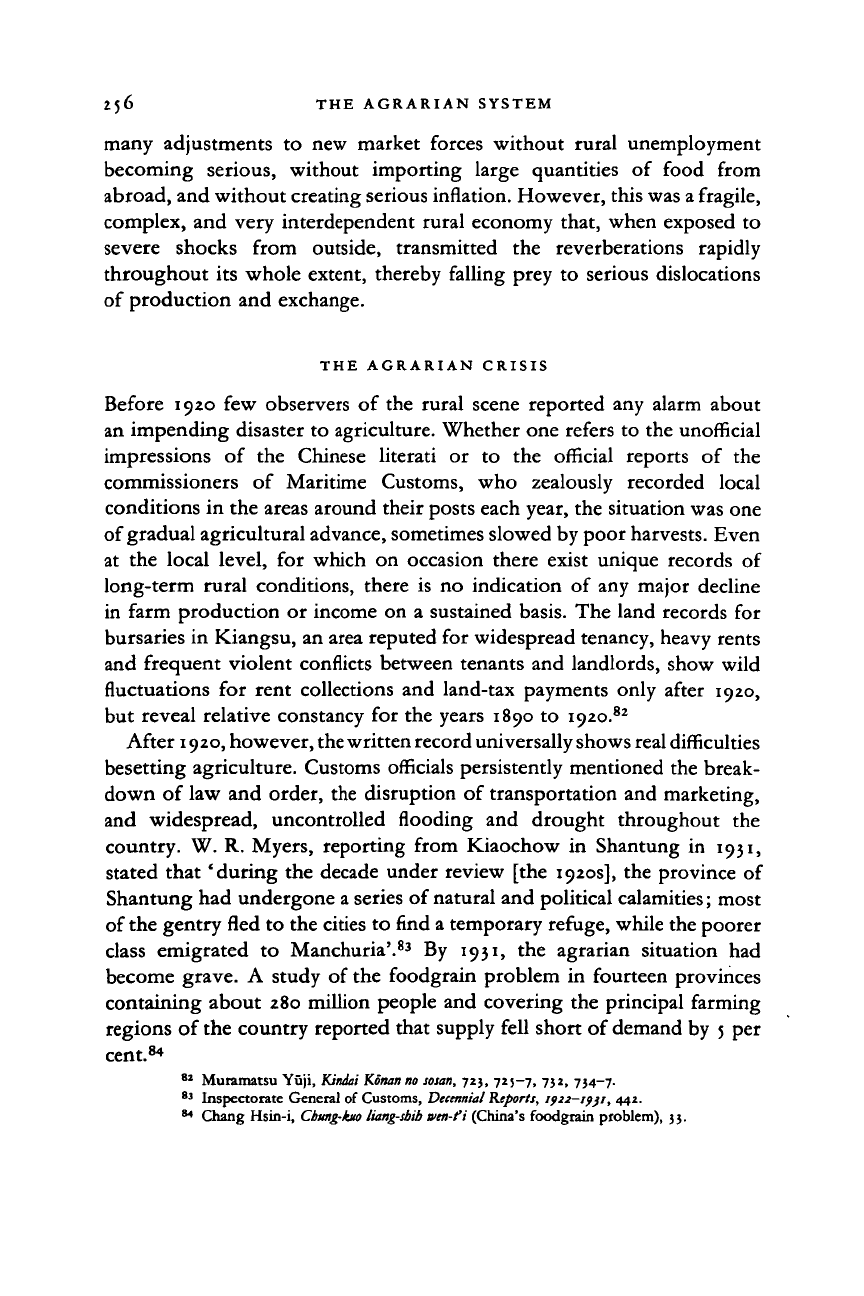
256 THE AGRARIAN SYSTEM
many adjustments to new market forces without rural unemployment
becoming serious, without importing large quantities of food from
abroad, and without creating serious inflation. However, this was a fragile,
complex, and very interdependent rural economy that, when exposed to
severe shocks from outside, transmitted the reverberations rapidly
throughout its whole extent, thereby falling prey to serious dislocations
of production and exchange.
THE AGRARIAN CRISIS
Before 1920 few observers of the rural scene reported any alarm about
an impending disaster to agriculture. Whether one refers to the unofficial
impressions of the Chinese literati or to the official reports of the
commissioners of Maritime Customs, who zealously recorded local
conditions in the areas around their posts each year, the situation was one
of gradual agricultural advance, sometimes slowed by poor harvests. Even
at the local level, for which on occasion there exist unique records of
long-term rural conditions, there is no indication of any major decline
in farm production or income on a sustained basis. The land records for
bursaries in Kiangsu, an area reputed for widespread tenancy, heavy rents
and frequent violent conflicts between tenants and landlords, show wild
fluctuations for rent collections and land-tax payments only after 1920,
but reveal relative constancy for the years 1890 to 1920.
82
After
1920,
however, the written record universally shows
real
difficulties
besetting agriculture. Customs officials persistently mentioned the break-
down of law and order, the disruption of transportation and marketing,
and widespread, uncontrolled flooding and drought throughout the
country. W. R. Myers, reporting from Kiaochow in Shantung in 1931,
stated that 'during the decade under review [the 1920s], the province of
Shantung had undergone a series of natural and political calamities; most
of the gentry fled to the cities to find a temporary refuge, while the poorer
class emigrated to Manchuria'.
83
By 1931, the agrarian situation had
become grave. A study of the foodgrain problem in fourteen provinces
containing about 280 million people and covering the principal farming
regions of the country reported that supply fell short of demand by
5
per
cent.
84
82
Muramatsu Yuji, Kiniai Konan no sosan, 723, 725-7, 732, 734-7.
83
Inspectorate General
of
Customs, Decennial Reports, 1922-19)1, 442.
84
Chang Hsin-i, Cbung-kjio liang-sbib wen-fi (China's foodgrain problem),
33.
Cambridge Histories Online © Cambridge University Press, 2008
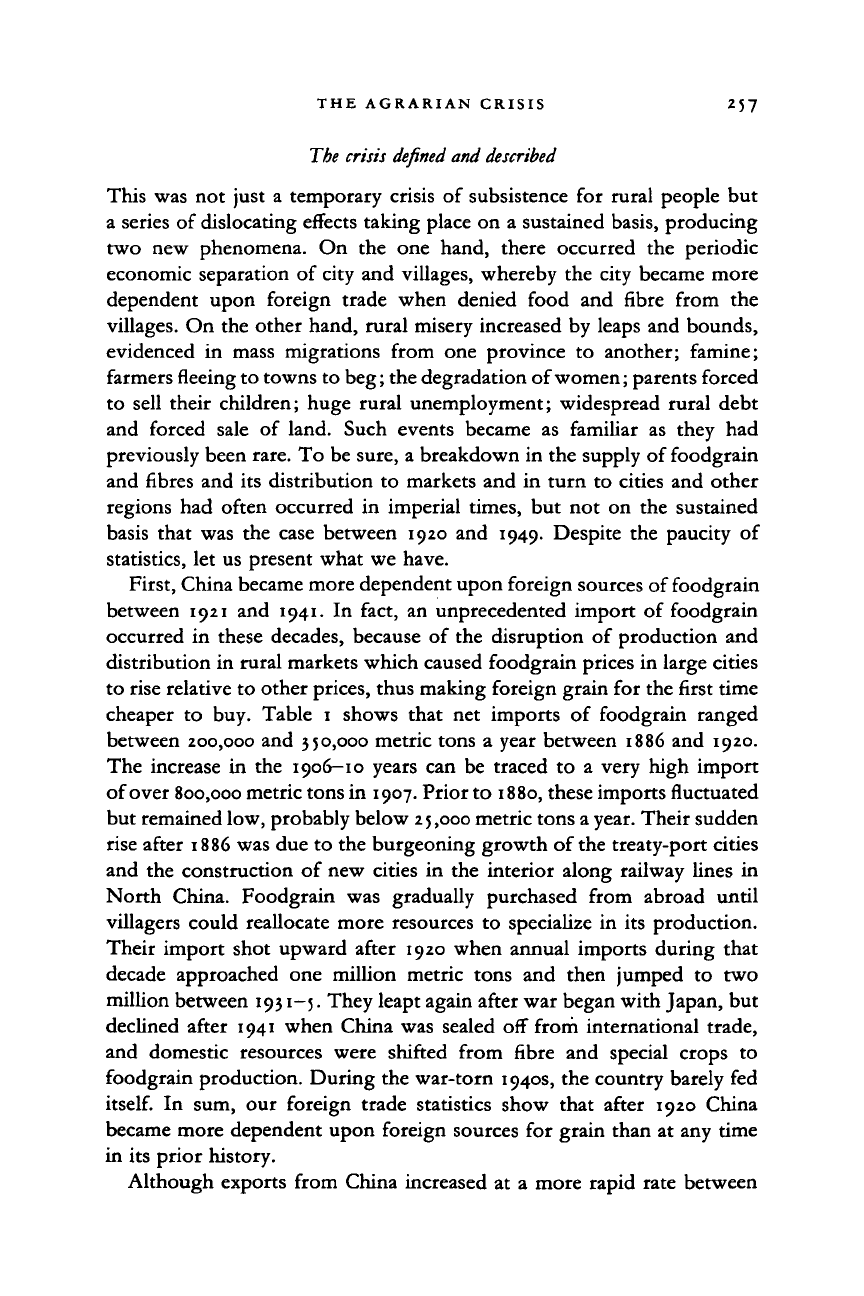
THE AGRARIAN CRISIS 257
The crisis defined and described
This was not just a temporary crisis of subsistence for rural people but
a series of dislocating effects taking place on a sustained basis, producing
two new phenomena. On the one hand, there occurred the periodic
economic separation of city and villages, whereby the city became more
dependent upon foreign trade when denied food and fibre from the
villages. On the other hand, rural misery increased by leaps and bounds,
evidenced in mass migrations from one province to another; famine;
farmers fleeing to towns to beg; the degradation of women; parents forced
to sell their children; huge rural unemployment; widespread rural debt
and forced sale of land. Such events became as familiar as they had
previously been rare. To be sure, a breakdown in the supply of foodgrain
and fibres and its distribution to markets and in turn to cities and other
regions had often occurred in imperial times, but not on the sustained
basis that was the case between 1920 and 1949. Despite the paucity of
statistics, let us present what we have.
First, China became more dependent upon foreign sources of foodgrain
between 1921 and 1941. In fact, an unprecedented import of foodgrain
occurred in these decades, because of the disruption of production and
distribution in rural markets which caused foodgrain prices in large cities
to rise relative to other prices, thus making foreign grain for the first time
cheaper to buy. Table 1 shows that net imports of foodgrain ranged
between 200,000 and 350,000 metric tons a year between 1886 and 1920.
The increase in the 1906—10 years can be traced to a very high import
of over 800,000 metric tons in
1907.
Prior to 1880, these imports fluctuated
but remained low, probably below 25,000 metric tons a year. Their sudden
rise after 1886 was due to the burgeoning growth of the treaty-port cities
and the construction of new cities in the interior along railway lines in
North China. Foodgrain was gradually purchased from abroad until
villagers could reallocate more resources to specialize in its production.
Their import shot upward after 1920 when annual imports during that
decade approached one million metric tons and then jumped to two
million between
1931—5.
They leapt again after war began with Japan, but
declined after 1941 when China was sealed off from international trade,
and domestic resources were shifted from fibre and special crops to
foodgrain production. During the war-torn 1940s, the country barely fed
itself.
In sum, our foreign trade statistics show that after 1920 China
became more dependent upon foreign sources for grain than at any time
in its prior history.
Although exports from China increased at a more rapid rate between
Cambridge Histories Online © Cambridge University Press, 2008
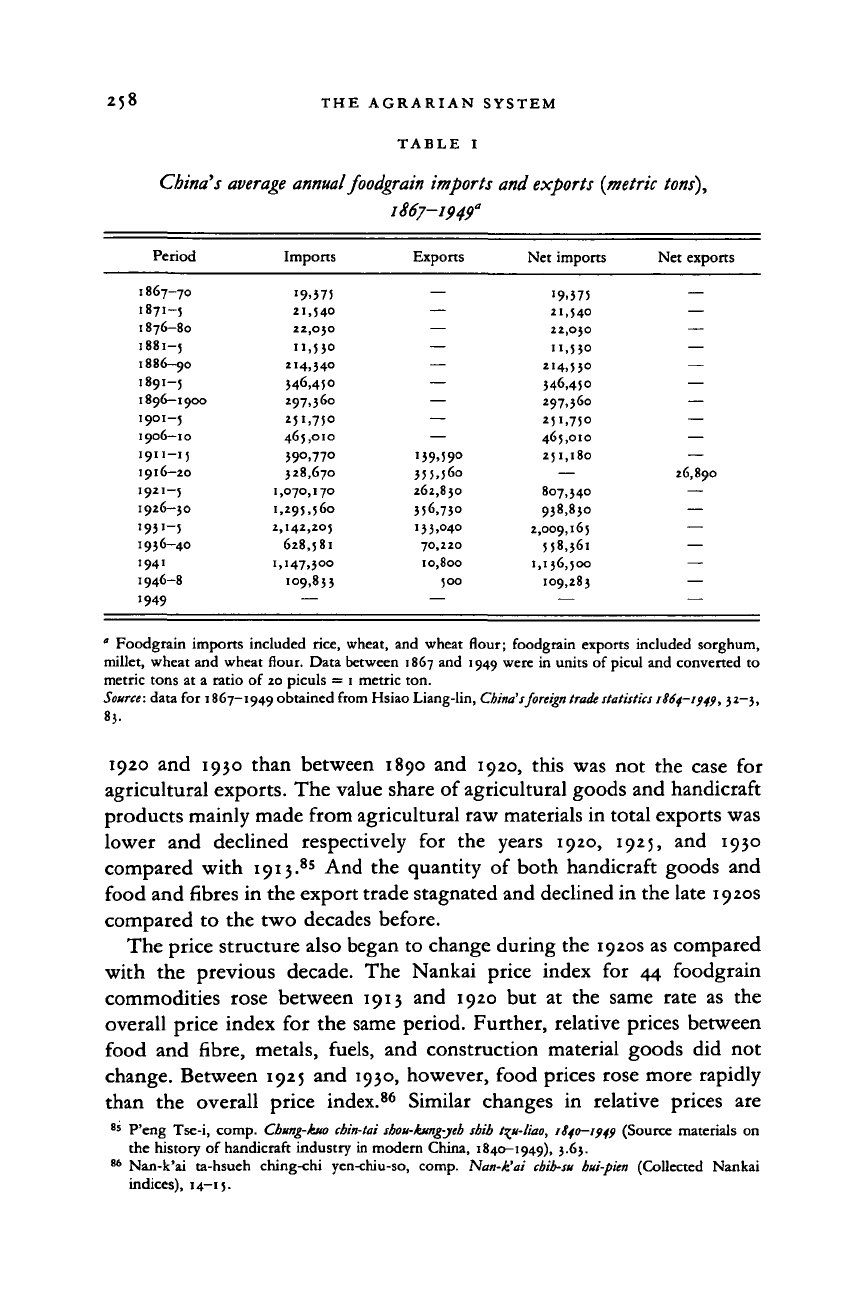
2
5
8
THE AGRARIAN SYSTEM
TABLE
I
China's
average
annual foodgrain imports
and
exports {metric tons),
1867-194?
Period
Imports
Exports
Net imports Net exports
1867-70
1871-5
1876-80
1881—5
1886-90
1891-5
1896—1900
I901-5
1906—10
1911-IJ
1916—20
1921-5
1926—30
1931-5
1936-40
1941
1946-8
1949
'9.37!
21,540
22,030
".53°
214,340
346,450
297,360
251.75°
465,010
39°.77°
328,670
1,070,170
1,295,560
2,142,205
628,581
1,147.3°°
109,833
—
—
—
—
—
—
—
—
—
—
139.59°
355.!6o
262,830
356,73°
133,040
70,220
10,800
500
—
'9.375
21,540
22,030
11,53°
214,53°
346,450
297,360
251,750
465,010
251,180
—
807,340
938,830
2,009,16;
558,361
1,136,500
109,283
—
26,890
'
Foodgrain imports included rice, wheat, and wheat flour; foodgrain exports included sorghum,
millet, wheat and wheat flour. Data between 1867 and 1949 were in units of picul and converted to
metric tons at a ratio of 20 piculs =
1
metric ton.
Source:
data for 1867-1949 obtained from Hsiao Liang-lin, China's
foreign trade statistics
1^64-1)0, 32-3,
83.
1920
and
1930
than between
1890
and
1920,
this
was not the
case
for
agricultural exports.
The
value share
of
agricultural goods
and
handicraft
products mainly made from agricultural
raw
materials
in
total exports
was
lower
and
declined respectively
for the
years
1920, 1925, and 1930
compared with
1913.
85
And the
quantity
of
both handicraft goods
and
food
and
fibres
in
the
export trade stagnated
and
declined
in the
late 1920s
compared
to the two
decades before.
The price structure also began
to
change during
the
1920s
as
compared
with
the
previous decade.
The
Nankai price index
for 44
foodgrain
commodities rose between
1913
and 1920 but at the
same rate
as the
overall price index
for the
same period. Further, relative prices between
food
and
fibre, metals, fuels,
and
construction material goods
did not
change. Between
1925
and
1930,
however, food prices rose more rapidly
than
the
overall price index.
86
Similar changes
in
relative prices
are
85
P'eng Tse-i, comp. Cbung-kuo cbin-tai shou-kung-yih sbib t^u-liao, 1S4O—190 (Source materials
on
the history
of
handicraft industry
in
modern China, 1840-1949),
3.63.
86
Nan-k'ai ta-hsueh ching-chi yen-chiu-so, comp. Nan-k'ai cbib-su bui-pien (Collected Nankai
indices),
14—15.
Cambridge Histories Online © Cambridge University Press, 2008
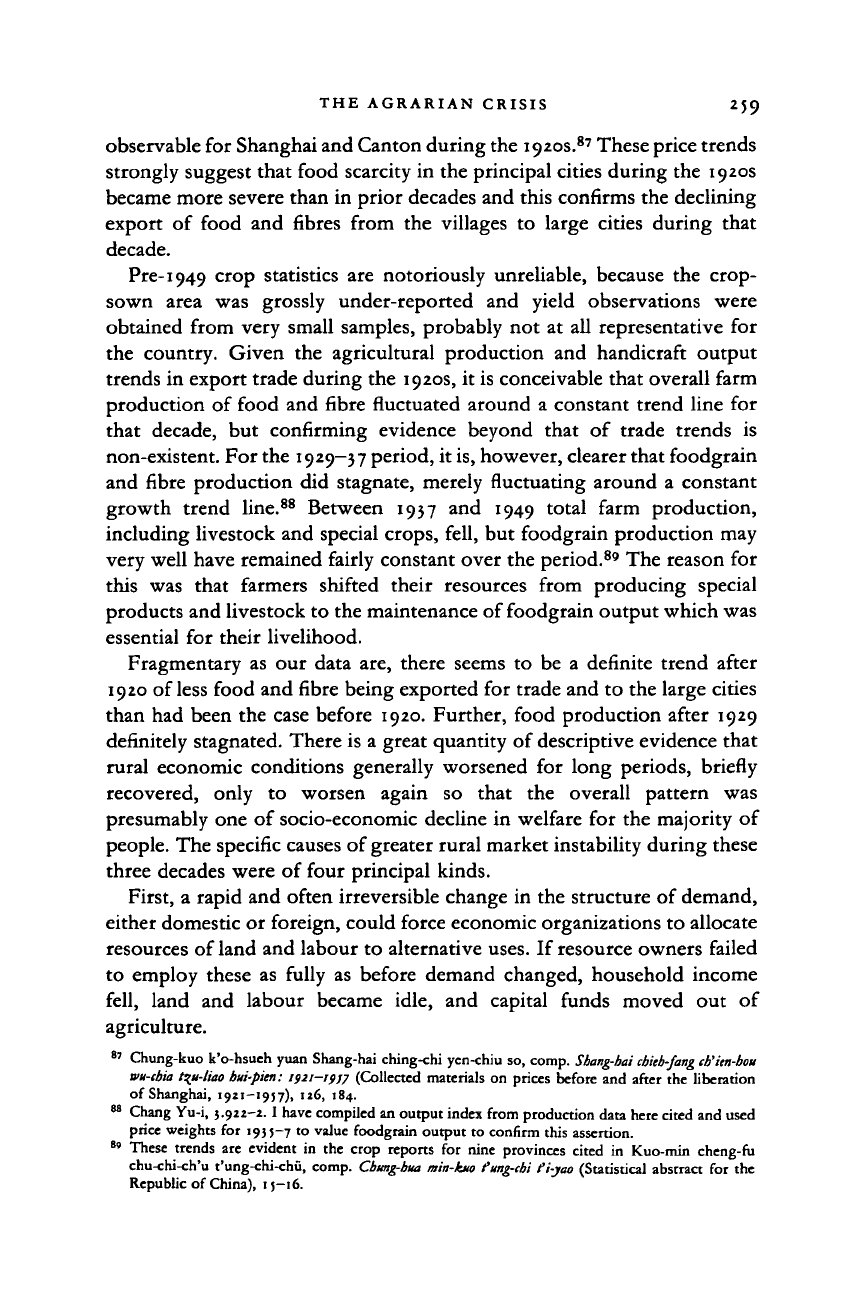
THE AGRARIAN CRISIS 259
observable for Shanghai and Canton during the 1920s.
87
These price trends
strongly suggest that food scarcity in the principal cities during the 1920s
became more severe than in prior decades and this confirms the declining
export of food and fibres from the villages to large cities during that
decade.
Pre-1949 crop statistics are notoriously unreliable, because the crop-
sown area was grossly under-reported and yield observations were
obtained from very small samples, probably not at all representative for
the country. Given the agricultural production and handicraft output
trends in export trade during the 1920s, it is conceivable that overall farm
production of food and fibre fluctuated around a constant trend line for
that decade, but confirming evidence beyond that of trade trends is
non-existent. For the 1929-37 period, it
is,
however, clearer that foodgrain
and fibre production did stagnate, merely fluctuating around a constant
growth trend line.
88
Between 1937 and 1949 total farm production,
including livestock and special crops, fell, but foodgrain production may
very well have remained fairly constant over the period.
89
The reason for
this was that farmers shifted their resources from producing special
products and livestock to the maintenance of foodgrain output which was
essential for their livelihood.
Fragmentary as our data are, there seems to be a definite trend after
1920 of
less
food and fibre being exported for trade and to the large cities
than had been the case before 1920. Further, food production after 1929
definitely stagnated. There is a great quantity of descriptive evidence that
rural economic conditions generally worsened for long periods, briefly
recovered, only to worsen again so that the overall pattern was
presumably one of socio-economic decline in welfare for the majority of
people. The specific causes of greater rural market instability during these
three decades were of four principal kinds.
First, a rapid and often irreversible change in the structure of demand,
either domestic or foreign, could force economic organizations to allocate
resources of land and labour to alternative uses. If resource owners failed
to employ these as fully as before demand changed, household income
fell,
land and labour became idle, and capital funds moved out of
agriculture.
87
Chung-kuo k'o-hsueh yuan Shang-hai ching-chi yen-chiu
so,
comp. Sbang-hai cbitb-fang cb'itn-bou
au-cbia t^u-liao bui-pien: 1921-19
JJ
(Collected materials
on
prices before
and
after
the
liberation
of Shanghai, 1921-1917),
126, 184.
88
Chang Yu-i, 5.922-2.1 have compiled
an
output index from production data here cited and used
price weights
for
1935-7
to
value foodgrain output
to
confirm this assertion.
85
These trends
are
evident
in the
crop reports
for
nine provinces cited
in
Kuo-min cheng-fu
chu-chi-ch'u t'ung-chi-chu, comp. Cbmg-bua min-kuo ftmg-cbi fi-jao (Statistical abstract
for the
Republic
of
China),
IJ—16.
Cambridge Histories Online © Cambridge University Press, 2008
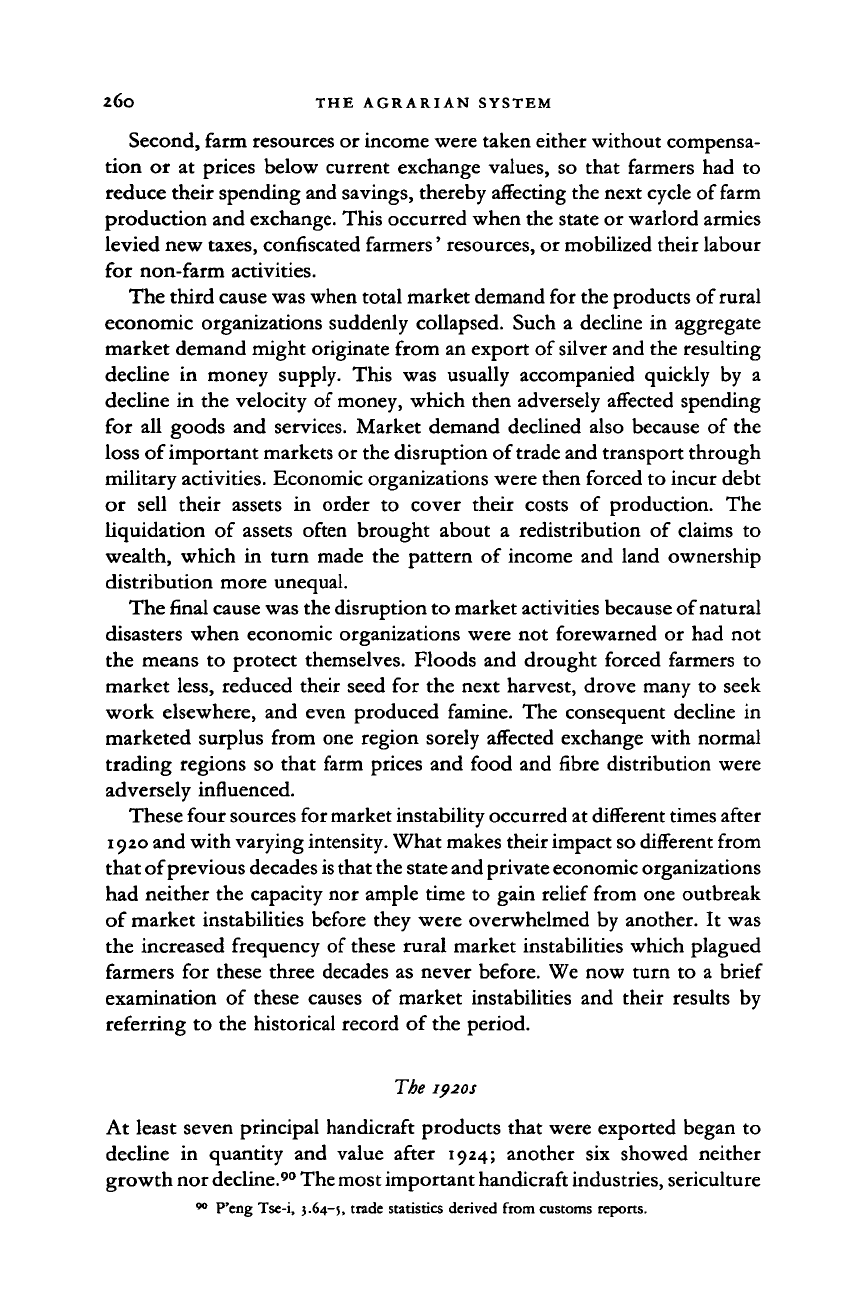
260 THE AGRARIAN SYSTEM
Second, farm resources
or
income were taken either without compensa-
tion
or at
prices below current exchange values,
so
that farmers
had to
reduce their spending and savings, thereby affecting the next cycle
of
farm
production and exchange. This occurred when the state or warlord armies
levied new taxes, confiscated farmers' resources,
or
mobilized their labour
for non-farm activities.
The third cause was when total market demand
for
the products of rural
economic organizations suddenly collapsed. Such
a
decline
in
aggregate
market demand might originate from an export
of
silver and the resulting
decline
in
money supply. This
was
usually accompanied quickly
by a
decline
in the
velocity
of
money, which then adversely affected spending
for
all
goods
and
services. Market demand declined also because
of
the
loss
of
important markets
or
the disruption of trade and transport through
military activities. Economic organizations were then forced to incur debt
or sell their assets
in
order
to
cover their costs
of
production.
The
liquidation
of
assets often brought about
a
redistribution
of
claims
to
wealth, which
in
turn made
the
pattern
of
income
and
land ownership
distribution more unequal.
The final cause was the disruption to market activities because of natural
disasters when economic organizations were
not
forewarned
or had not
the means
to
protect themselves. Floods
and
drought forced farmers
to
market less, reduced their seed
for the
next harvest, drove many
to
seek
work elsewhere,
and
even produced famine.
The
consequent decline
in
marketed surplus from
one
region sorely affected exchange with normal
trading regions
so
that farm prices
and
food
and
fibre distribution were
adversely influenced.
These four sources for market instability occurred at different times after
1920 and with varying intensity. What makes their impact so different from
that of previous decades
is
that
the
state and private economic organizations
had neither the capacity
nor
ample time
to
gain relief from one outbreak
of market instabilities before they were overwhelmed
by
another.
It was
the increased frequency
of
these rural market instabilities which plagued
farmers
for
these three decades
as
never before.
We now
turn
to a
brief
examination
of
these causes
of
market instabilities
and
their results
by
referring
to the
historical record
of
the period.
The 1920s
At least seven principal handicraft products that were exported began
to
decline
in
quantity
and
value after
1924;
another
six
showed neither
growth nor decline.
90
The most important handicraft industries, sericulture
90
P'eng Tse-i, 3.64-5, trade statistics derived from customs reports.
Cambridge Histories Online © Cambridge University Press, 2008
